Top-rated photography drones for professional use and beginners.
Drones allow photographers to take stunning photos without booking a plane or helicopter flight. More and more photographers who specialize in landscape, real-estate and portrait photos master new technologies and techniques to update their portfolios with breathtaking pictures taken with the help of a drone.
Most professional drones that are sold in a higher price bracket cost at least $2K. However, if you are on a tight budget, you can still find a reliable drone that will cost you no more than $500-$1,000. Such drones are perfectly suitable for novice users.
On this list, we have rounded up the models that allow you to shoot pictures and videos at high quality. They are fitted with rotating cameras and in-built image stabilization features that enable you to take clear pics even in difficult shooting situations.
I have tested drones for different budgets and needs. Their manufacturers used the most recent flight-control and camera technologies to ensure that these models can cope with any obstacle that comes their way.
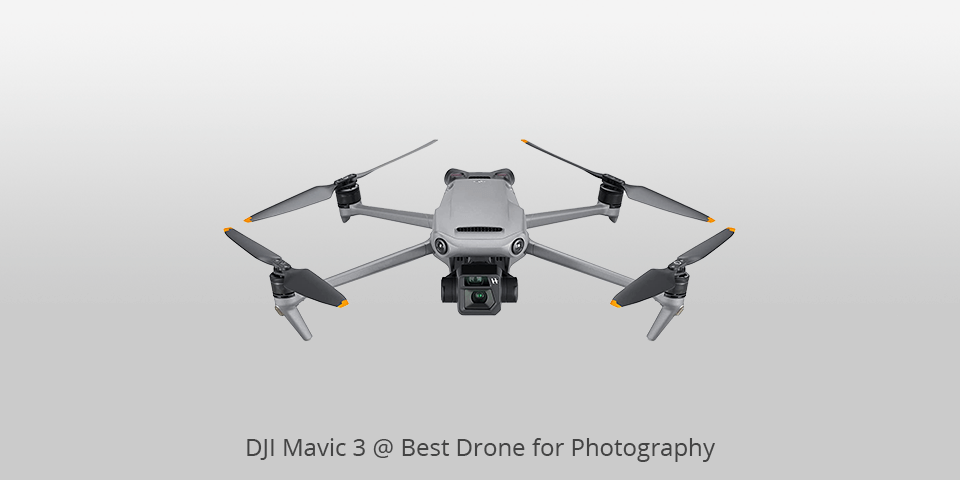
Weight: 895g | Camera effective pixels: 20 MP | Control modes: Remote Controller (RC) | Hover or attitude holding: 46 min
The DJI Mavic 3 is similar to the Mavic Air 2 in terms of functionality and costs 2½ times less. It’s fitted with a top-level 4/3 image sensor and features a powerful Hasselblad camera. With it, you can capture 20MP photos and 5.1K videos with rich colors. Another advantage of this drone is its impressive battery capacity. You can use it for 46 minutes, which explains its top position on this list. To further enhance your aerial photography experience, consider pairing the DJI Mavic 3 with the best FPV goggles available, for example, DJI Digital FPV. With First Person View goggles you can experience a more engaging and thrilling perspective as you navigate the drone through the skies, capturing breathtaking aerial shots with precision.
What makes it the best drone for photography is that it features sensors for quick obstacle detection. You don’t need to worry about losing it as it comes with automated features that allow you to bring it back safely. The drone automatically selects the safest flight route.
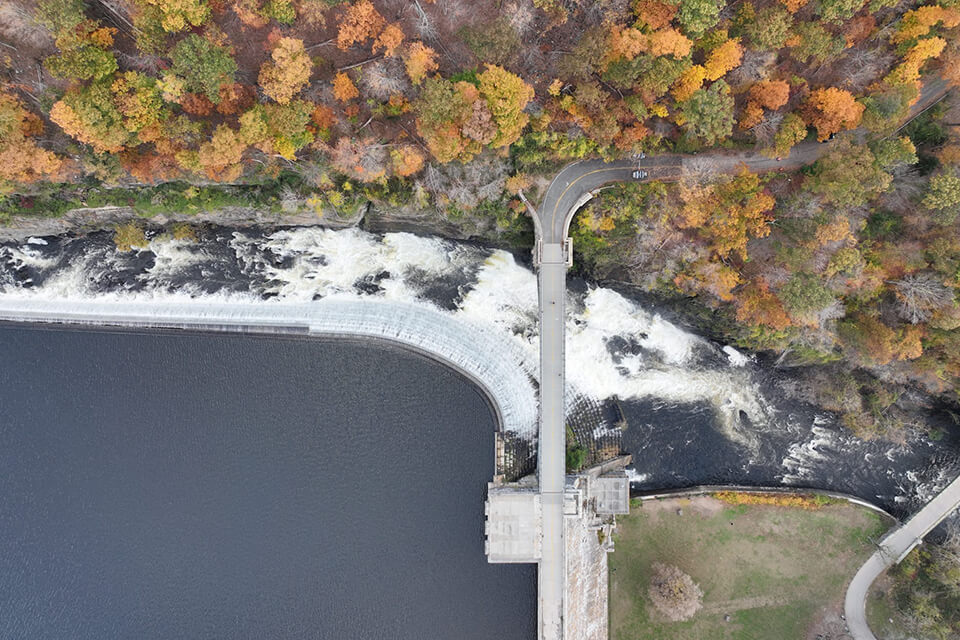
Photo taken with DJI Mavic 3
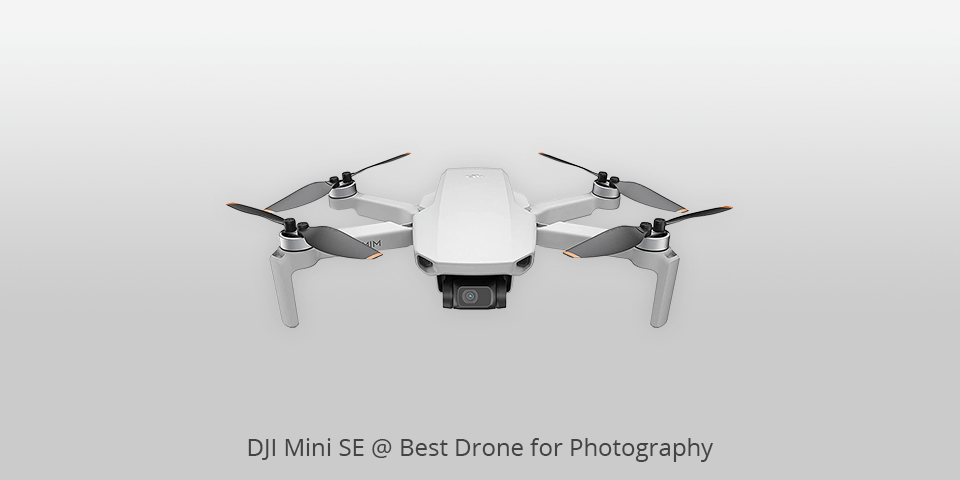
Weight: 242g | Camera effective pixels: 12 MP | Control modes: Remote Controller (RC) | Hover or attitude holding: 30 min
The DJI Mini SE is an advanced drone that doesn’t take up a lot of space and can fit in any drone backpack. It makes it perfect for travel photographers and aerial photography enthusiasts. While it’s pretty lightweight, it has features that make it wind-resistant.
Since this drone doesn’t weigh more than 250 g, there is no need to register it with authorities. It stands out among other budget models and has an easy-to-use native app that allows you to land it automatically. Besides you can quickly return your drone home and ensure that it’s properly cooled.
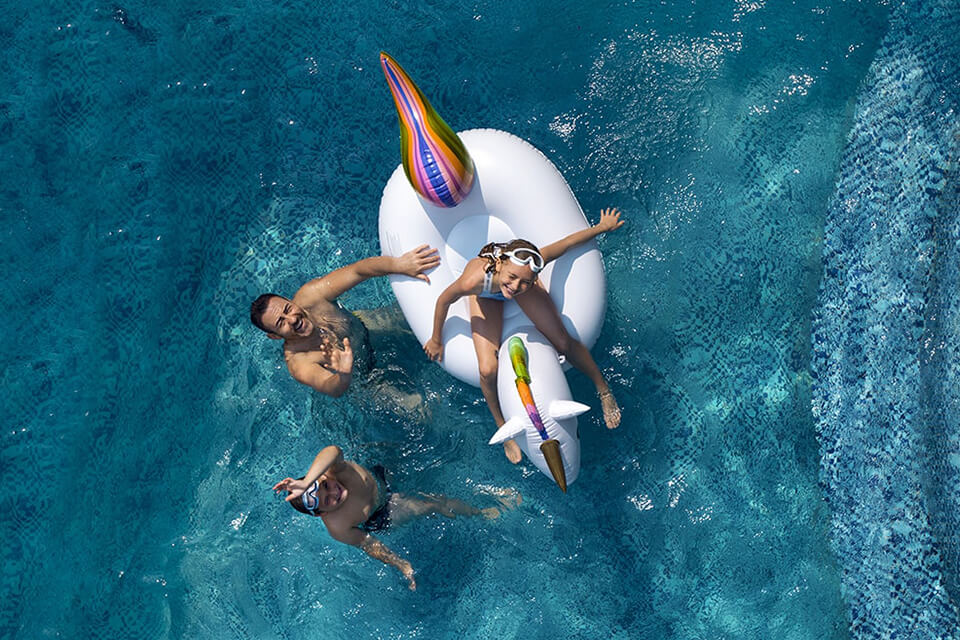
Photo taken with DJI Mini SE
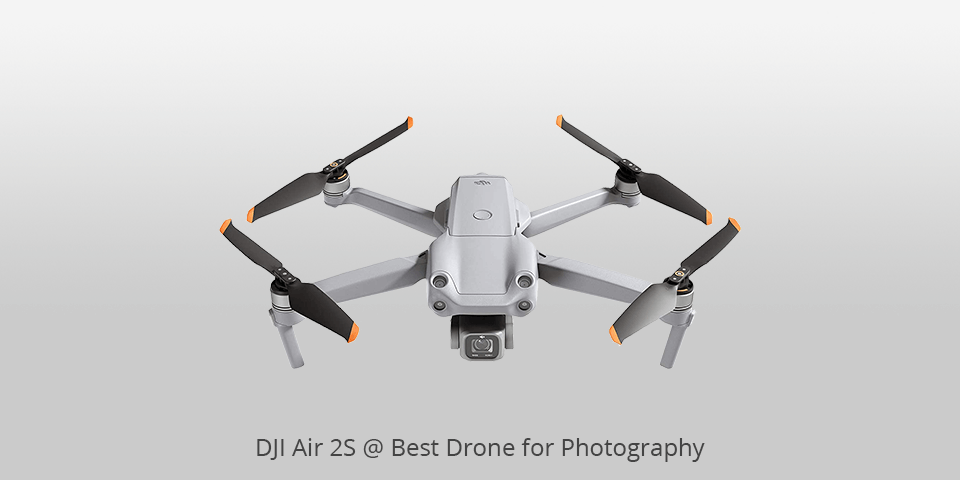
Weight: 600g | Camera effective pixels: 20 MP | Control modes: Remote Controller (RC) | Hover or attitude holding: 31 min
The DJI Air 2S comes with a set of edgy features, a professional camera, and intuitive controls for a seamless experience. While this model is quite affordable, it’s reliable and secure. Thanks to the obstacle avoidance sensor, you don’t need to worry that your drone will collide with any obstacles on its way.
The key selling point of this camera drone is its 1-inch sensor that allows photographers to take 20MP photos and shoot videos in 5.4K. It basically makes this drone comparable with the pricier Mavic 3.

Photo taken with DJI Air 2S
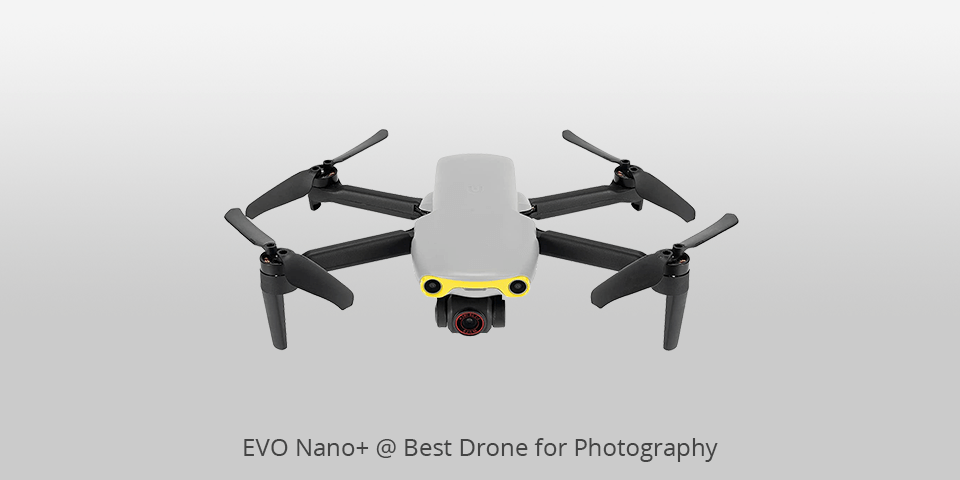
Weight: 249g | Camera effective pixels: 50 MP | Control modes: Remote Controller (RC) | Hover or attitude holding: 30 min
The EVO Nano+ features a 1/1.28-inch CMOS sensor, which allows you to take 50MP pics. An RYYB color filter and an f/1.9 aperture account for low noise levels. Thanks to it, you can take pro-level photos in low-light conditions.
It is a unique drone of such a size that is equipped with a pro-grade obstacle avoidance system. It makes it perfect for photographers who are interested in aerial photography and want to shoot engaging content. In addition, it’s fitted with 3-way sensors that support binocular vision and allow this model to avoid obstacles on its way regardless of the direction of its flight.
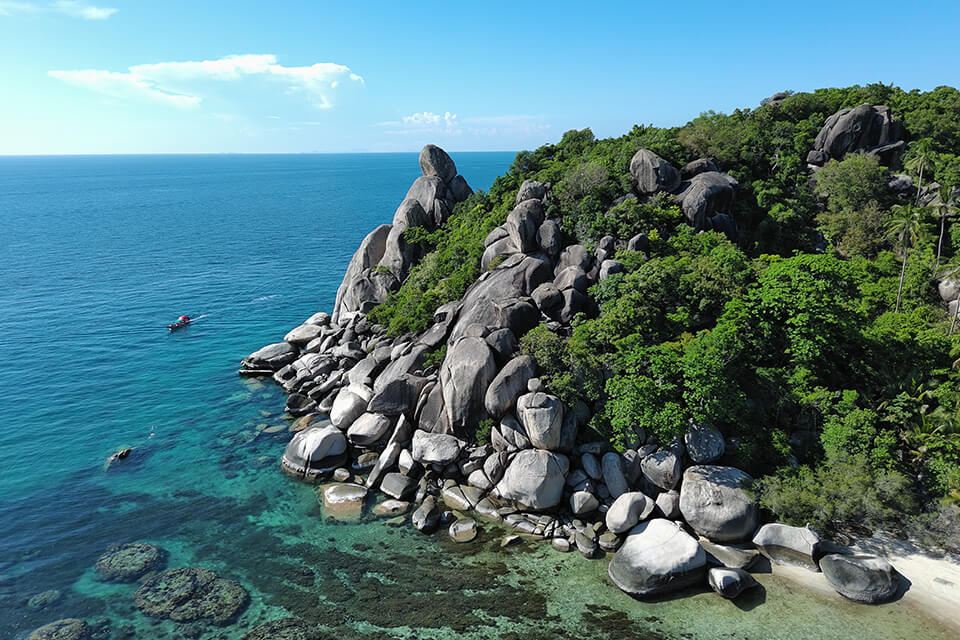
Photo taken with EVO Nano+
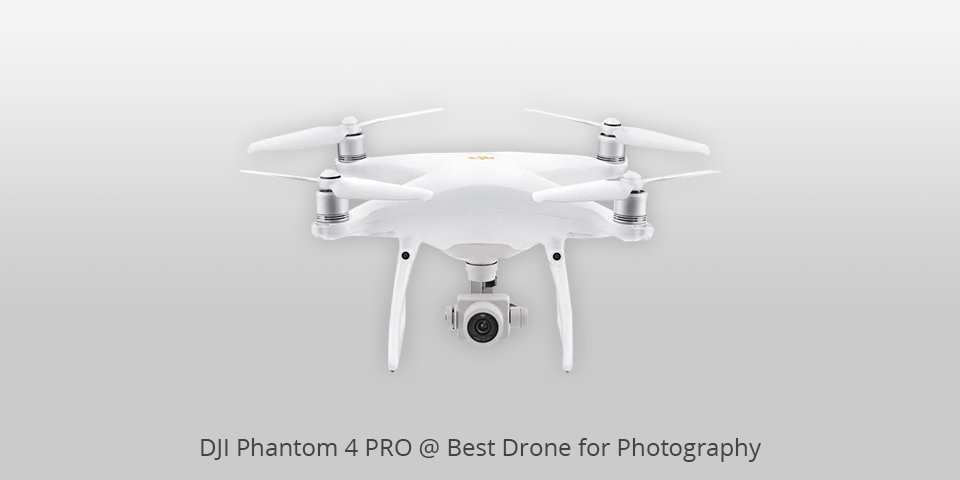
Weight: 468g | Camera effective pixels: 20 MP | Control modes: Remote Controller (RC) | Hover or attitude holding: 30 min
It is definitely the best product for drone wedding photography. The creators of the DJI Phantom 4 Pro used all the latest technological developments and fitted it with a 1-inch sensor camera with a mechanical diaphragm, safety sensors on all sides and a capacious battery.
What makes it different from other drones for photography is that its camera has a high contrast ratio, the maximum ISO of 12800 and a photosensitive f2.8 aperture. The lens has a wide viewing angle of 84°. The CMOS sensor is four times larger than in the cameras of most other drones. So, you can receive shots of excellent quality. This best drone for aerial photography has a new camera that can compete with professional ground and video cameras.

Photo taken with DJI Phantom 4 PRO
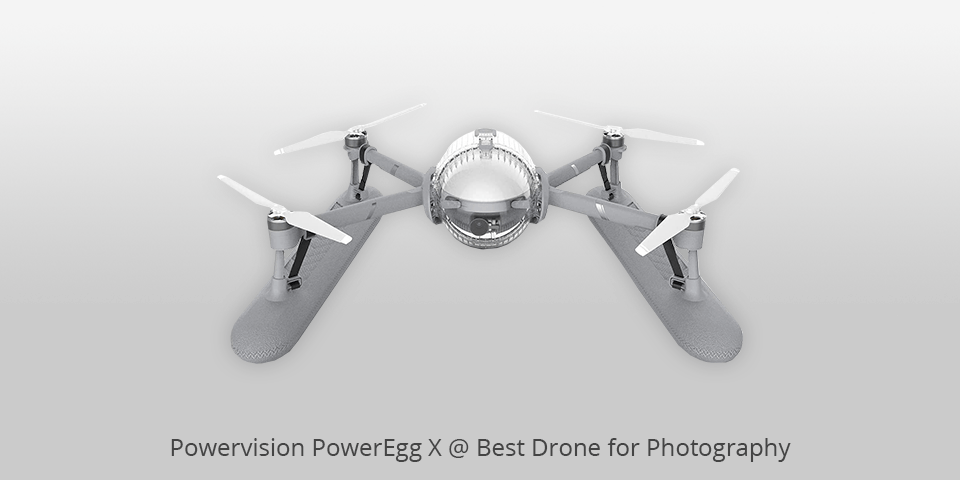
Weight: 860g | Camera effective pixels: 12 MP | Control modes: Remote Controller (RC) | Hover or attitude holding: 30 min
The PowerEgg X was created as a more affordable alternative to overpriced drones. It comes with a variety of advanced features and is fully weatherproof, which makes it possible to use it in different shooting scenarios. Besides, it remains stable even in challenging weather conditions. However, there are some disadvantages as well. You can take photos in different modes but it might be difficult to switch between them quickly. In addition, you might notice some issues with its software.
It’s fitted with a decent 12MP camera. You can take 27mm equivalent pics without any noticeable fish-eye effect. This model doesn’t compress pictures as much as other models do. You can shoot in RAW and configure the camera settings manually, which will make it easier for you to enhance your photos later. For instance, you may edit your pics to remove a slightly noticeable vignette effect.
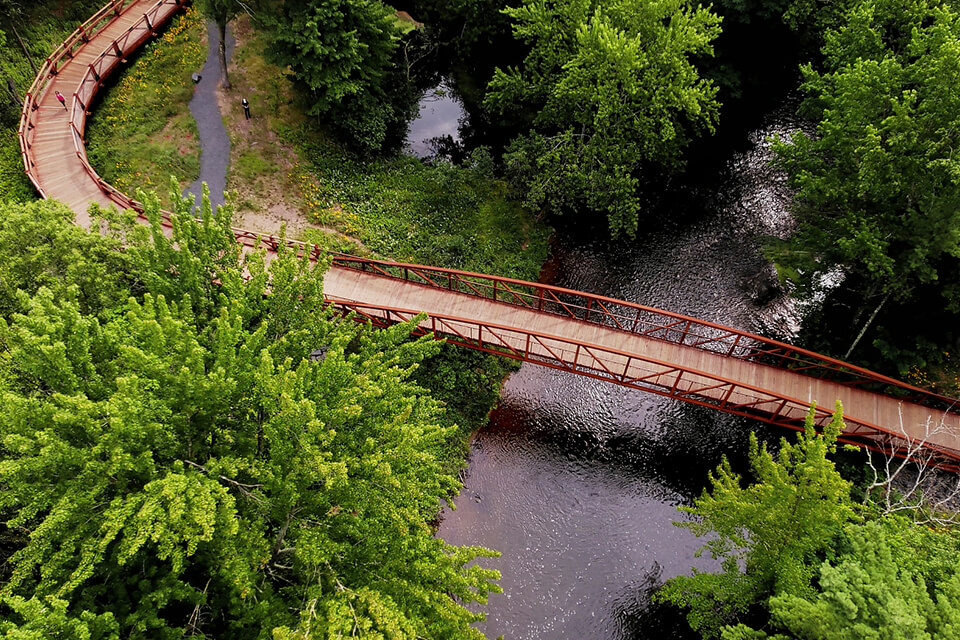
Photo taken with Powervision PowerEgg X
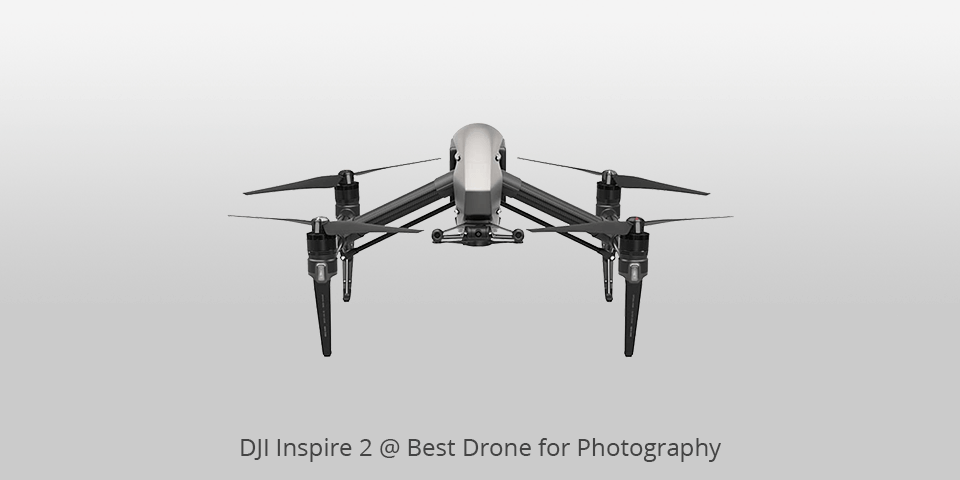
Weight: 3440g | Camera effective pixels: 20 MP | Control modes: Remote Controller (RC) | Hover or attitude holding: 27 min
The DJI Inspire 2 is the most high-performance consumer drone for photography and video recording. It demonstrates impressive functionality and great camera features. This drone can be considered the benchmark for filmmaking.
This drone with camera has an adjustable lifting chassis. The camera can rotate 360° without the risk of getting the drone’s elements into the frame. The most interesting thing is that it is fitted with three cameras that differ in their capabilities. Besides, this model is quite affordable.
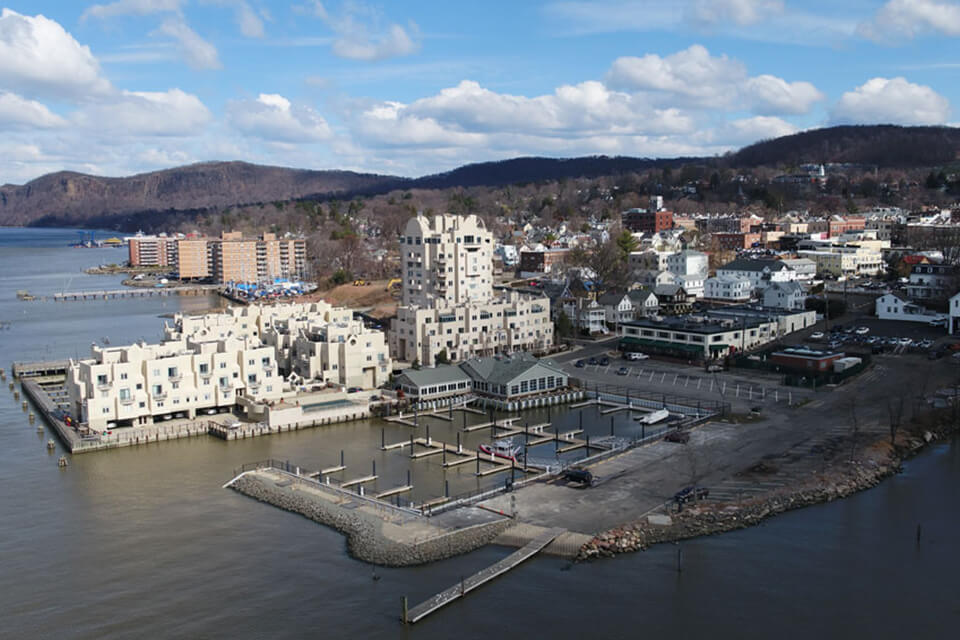
Photo taken with DJI Inspire 2
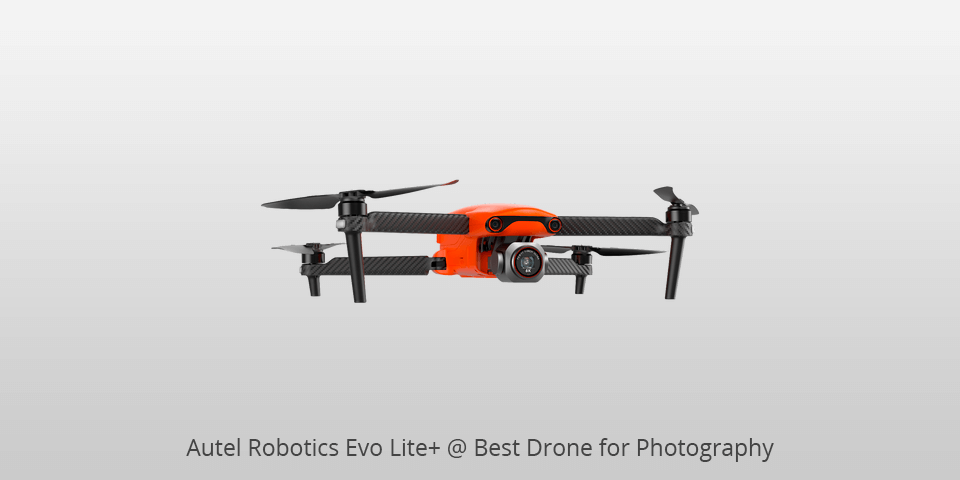
Weight: 1100g | Camera effective pixels: 20 MP | Control modes: Phone + Optional devices | Hover or attitude holding: 40 min
One of the standout features of the Evo Lite+ is its 6K camera. With a large 1-inch sensor and 20MP CMOS, it allows for high-quality photos, even in low-light conditions. The adjustable aperture gives photographers the flexibility to experiment and showcase their creative style.
The drone also offers several automated shooting modes, making it easy to achieve cinematic shots with proficiency. This is particularly useful for photographers who are new to drone photography, as it takes the guesswork out of capturing stunning aerial footage.
Battery life is always a concern when it comes to drones, and the Evo Lite+ doesn't disappoint in this aspect. With an impressive 40-minute flight time, you can spend more time capturing breathtaking shots and less time worrying about recharging.
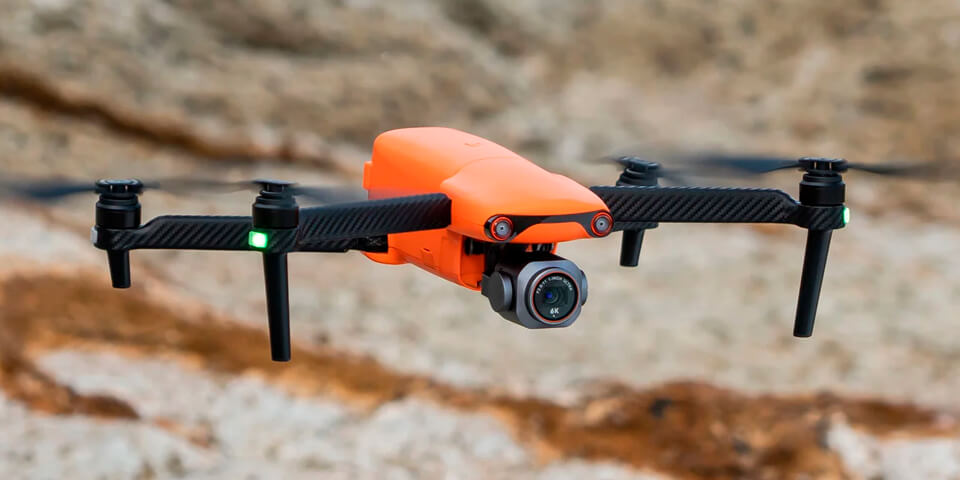
Photo taken with Autel Robotics Evo Lite+
| IMAGE | NAME | FEATURES | |
|---|---|---|---|

|
DJI Mavic 3
OUR CHOICE
|
CHECK PRICE → | |

|
DJI Mini SE
COMPACT
|
CHECK PRICE → | |

|
DJI Air 2S
DURABLE
|
CHECK PRICE → |
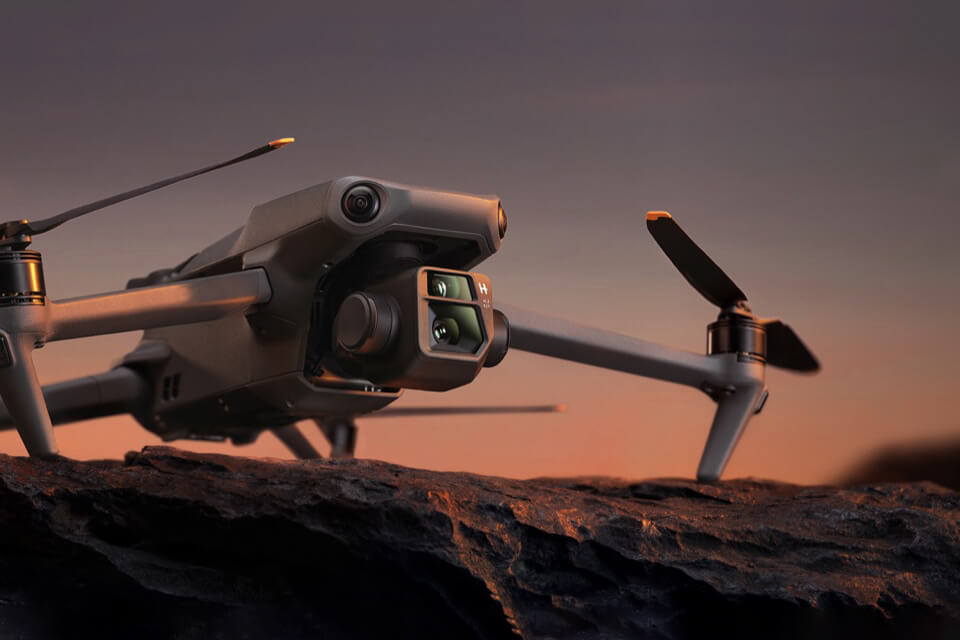
Whether you are looking for a budget or a high-end drone, you will find a variety of models to choose from. These days, you can find both basic photography drones and more expensive models fitted with pro-grade cameras on the market. Read on to learn how to choose a drone while taking the most important factors in account.
A larger camera matrix typically translates to better image quality, especially in low-light conditions, as it allows for larger individual pixels. These larger pixels can gather more light, resulting in reduced noise, improved dynamic range, and enhanced overall image quality.
When it comes to drones, the physical size of the camera matrix is often limited due to the compact nature of these devices. However, advancements in technology have allowed for smaller drones to incorporate larger camera matrices without compromising on portability and flight performance. The minimum size that you should pay attention to when choosing a drone to take pictures is 1/2.3 inches, this is standard. Anything less is not serious and not good for high-quality photos. Ideally, you need a drone with a 1-inch matrix.
The higher it is, the sharper photos you’ll get, because you need to show all the details in the photo. The minimum that you should pay attention to is 12MP. Ideally, it is 20MP.
The minimum is 15 minutes. Optimally, the flight time should be 25-30 minutes. Take into account that the time depends on the air temperature, wind strength and the manner of drone control. Usually, the real time is 2-4 minutes less than indicated by the manufacturer.
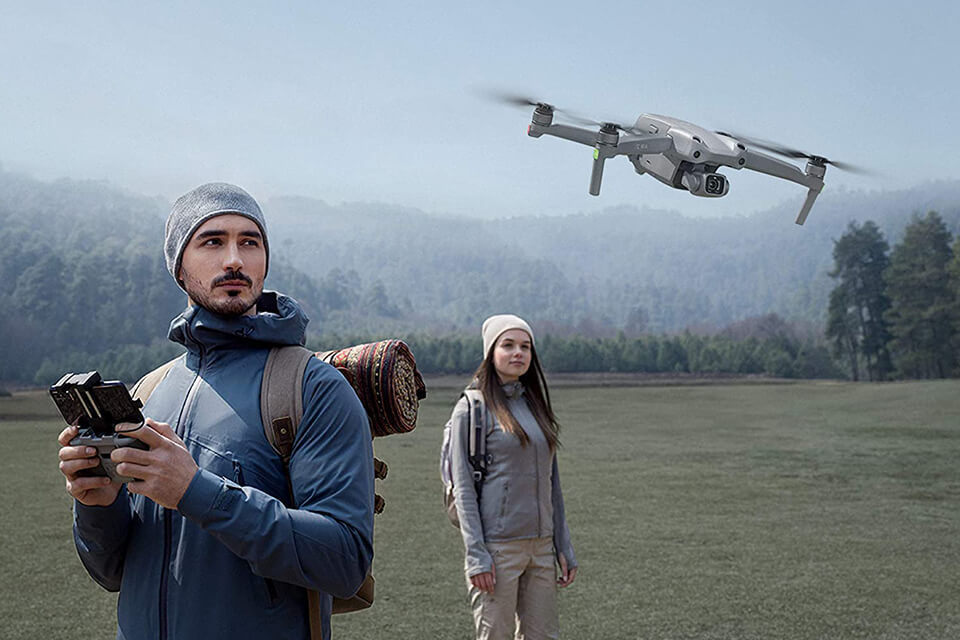
If a camera drone is used for shooting weddings and other celebrations, 100 m is enough, but if you are looking for the best drone for travel photography to shoot nature and landscapes, a distance of at least 2 km is necessary.
Besides, the flight distance indicated by the manufacturer will be true only under ideal conditions (outside the city in open areas where there is no radio interference, power lines, etc.). In a big city, the distance is 2-3 times less than the stated one. The maximum height is usually limited at the program level (usually 500 m).
This is yet another crucial factor that has a huge impact on image quality. If your drone moves unexpectedly, your pictures might get blurry and it will be impossible for you to capture everything in detail.
To ensure stable hovering under any conditions, your drone should have an advanced control system and in-built sensors. Many professional photographers believe that DJI drones can easily beat their competitors when it comes to stable hover flights.
The most affordable models are made of plastic, which makes them quite lightweight. Racing models are usually made of carbon. Metal drones have more durable frames but they are typically more expensive.
There are plenty of foldable drones that don’t cost a lot, which makes them perfect for travelers. They can be easily folded and don’t take up a lot of space in your luggage. Such models are very convenient and compact.
Drones might have fully or partially protected propellers. It ensures that their rotors won’t be significantly affected by a crash. Besides, all drones have additional security measures in place that protect them during landing. In addition, their cameras may be covered by a transparent plastic cap that prevents possible damage.
Keep in mind that it's important to perform regular maintenance and pre-flight checks to ensure that the drone's components are functioning correctly. This includes inspecting the propellers, battery, and camera equipment before each flight.
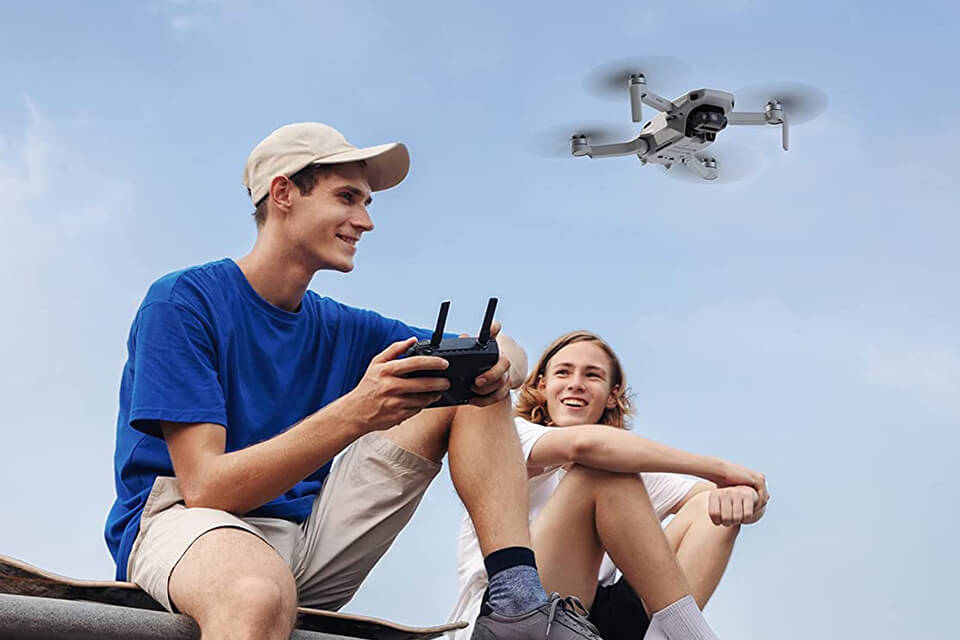
A good drone for taking photos costs a lot. It happens because such models are usually fitted with great cameras and control systems. Besides, they have many smart features that significantly facilitate the shooting process.
The best indoor drones as well as outdoor models can automatically track the object, take selfies, and use pre-programmed flight routes. Each quadcopter comes with a unique set of features and solutions.
In case you aren’t going to edit your photos in Photoshop or Lightroom, there is no need to pay attention to the formats supported by a drone. However, in all other cases, it’s an important thing to consider. If a drone for shooting photos supports RAW and DNG formats, it will be easier for you to enhance your images afterward.
What makes these formats different is that they save all the information captured by a camera. They are really helpful for saving photos taken at night.
If you are into aerial photography, then the answer is yes. Besides, drones are often used by travelers and bloggers who want to share photos about their experiences. They are easy to master and come with handy features that make them perfect even for beginners. Using them, you can take photos that are impossible to take with a regular camera.
If you are going on a trip to perform aerial drone photography, you should carefully examine the legislation of the host country and read a drone insurance guide. Probably, you’ll need a license for flights, or they may be completely prohibited.
Yes, every model has limited capabilities. Some drones can fly only 100 m, however, if you opt for a more expensive drone, it should be able to fly up to 5 miles. When selecting a drone, think about the task you need to achieve. Models that can fly longer allow you to capture more stunning pictures, which makes it easier to take photos of different subjects from afar.
Yes, the Federal Aviation Administration (FAA) has all the technical capabilities that allow it to do it. Besides, they introduced a new proposal of stricter measures that will give them the right to track every drone in the country.
While there are no restrictions concerning the usage of drones after sunset, you can do it only if you have a model fitted with a special lighting system that will help you see the location of your drone. In case you decide to use a strobe light, make sure to register your drone in FAA as its weight is likely to exceed 250 g.